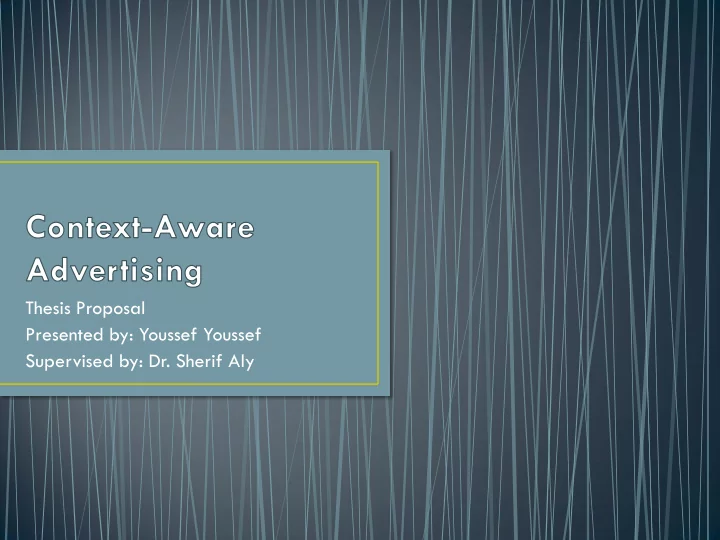

Thesis Proposal Presented by: Youssef Youssef Supervised by: Dr. Sherif Aly
• The invention of IPTV created an opportunity for product and service providers to better target their audience and cater for their needs. This is called behavioral targeting • Helping users receive information on services or products that are more relevant to the target users will help providers increase revenues. • To the best knowledge of the author, this opportunity has not been consumed to its full benefit yet. • This research will capitalize on this opportunity to create a context- aware recommendation engine that recommends advertisements for IPTV systems. • The engine will be developed over a scalable architecture and technology that supports near real-time requests.
• There is a huge market for advertising • Increasing the benefit from these advertisements will result in increasing the revenues • Behavioral targeting of content to users is a $20 billion industry and it is growing rapidly [1]
• Create a centralized recommendation model that is context aware and scalable. • The model will support real-time requests where each request contains the context of a user or a group of users • The system will recommend a set of advertisements that are most relevant to the user or the group. Recommending a set of advertisements to a group of users will help in increasing bandwidth efficiency.
• This is currently a work in progress. • Current suggestions: • Use Spark technology for in-memory, distributed computing [6] • Use a queuing system for inputs and outputs • Use recommendation engine supplied by MLlib (Spark module) • Since Spark runs Scala and Java, there is a possibility to use Weka [7] machine learning libraries instead. • Deploy over a Hadoop cluster to utilize its features
• The concept of context-aware advertising applies to IPTV systems and mobile advertising systems. • Contributions in IPTV systems cover ad placement, bidding models [1], and architecture [2] • Contributions in mobile advertising cover developing a research model such as [3], creating a new recommendation algorithm that factors in context data such as [4] or propose a delivery system such as [5]. • Context-Awareness also applies for recommending content to users in IPTV systems. This has been already studied but not included in this presentation for brevity.
Feature/Paper [1] [2] [3] [4] [5] Type Paper Patent Paper Paper Paper Target Advertising Advertising Advertis Advertising Advertising ing Context Information User Context Age Yes Yes Identity Yes Profile/Preferences Yes Yes Yes Location Yes Yes Yes Yes Granularity of location Room GPS Visiting Area GPS and Abstract Street/Building User Activities Web Browsing Activities Yes TV Viewership Activities Emotions Yes (proposed) Needs Utilitarian/Hedonic Agenda Consumption History Gender Purchase History Service Context Current Program Yes Brand Information Yes Promotion Yes Content Language Content Format Content Description Access rights Location Current Content Viewership Rating/Actual Viewership Computing Context Network and Bandwidth Yes Device Type Yes Yes Device Status Operating System Yes Physical Context Surrounding Environment Yes Nearby Objects Yes Weather Yes History Context Time Day Week day Time of Day Week end Day of Week Visiting Time Month Season Privacy Session Mobility
• Most of the papers do not discuss performance or scale of their solutions (how many users can they support, or rate of recommendation – throughput) • Several papers did not report on the accuracy or effectiveness of their proposed solution • As can be seen in the table on the previous slide, most information comes from statically input data such as demographics and interests and very few context parameters are being used.
• There is room for contribution in the field of context-aware advertising to further enrich the recommendation engine with more context data • The exact context information is not decided yet. • There is also a need to provide a scalable architecture that can support real-time requests for recommending advertisements.
1. Kodialam, Murali, et al. "Online scheduling of targeted advertisements for IPTV." INFOCOM, 2010 Proceedings IEEE . IEEE, 2010. 2. Cankaya, Hakki. "System and method for providing context-aware local advertising in IPTV systems." U.S. Patent Application 11/311,838. 3. Xu, David Jingjun, Stephen Shaoyi Liao, and Qiudan Li. "Combining empirical experimentation and modeling techniques: A design research approach for personalized mobile advertising applications." Decision Support Systems 44.3 (2008): 710-724. 4. Dao, Tuan Hung, Seung Ryul Jeong, and Hyunchul Ahn. "A novel recommendation model of location-based advertising: Context-Aware Collaborative Filtering using GA approach." Expert Systems with Applications 39.3 (2012): 3731-3739. 5. Hristova, Nataliya, and Gregory MP O'Hare. "Ad-me: wireless advertising adapted to the user location, device and emotions." System Sciences, 2004. Proceedings of the 37th Annual Hawaii International Conference on . IEEE, 2004. 6. "Spark". http://spark.apache.org/ 7. "Weka". http://www.cs.waikato.ac.nz/ml/weka/
Recommend
More recommend